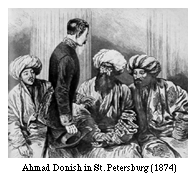
|
|

|
|
The first phase of Donish's career includes three trips to Russia. These trips acquainted him with life in St. Petersburg and expanded his knowledge and world view. During the first trip, for instance, he not only participated in official negotiations but also arranged visits to the literary and industrial centers of St. Petersburg. Upon his return to Bukhara in 1850, however, his high hopes that the Amir would implement some of his suggested reforms were shattered. The Amir accepted only what was of military and economic interest to him and summarily rejected all advice regarding social, educational, and cultural reforms.
Donish faired even worse when the selfish Amir Muzaffar (ruled, 1860-1885). Muzaffar systematically alienated all the worthy and experienced officials who had assisted his father. As for Donish, he was isolated. In fact, Donish's role in the government at this time would be totally obscure were it not for his Manozir al-Kavokib, (1865; The Placement of the Planets). Could he have been Amir Muzaffar's court astronomer?
In 1868, against all advice, Amir Muzaffar challenged Russia's might for a second time and was defeated. Following the signing of a forced Treaty of Friendship, the Amir sent a delegation to Russia. Donish was appointed the delegation's consultant. He spent the period between June 1869 and March 1870 in St. Petersburg reestablishing ties that had been severed by war. As a result of his involvement in the negotiations, Donish's influence and prestige as Bukhara's most experienced and informed politician increased dramatically. As for Donish, he not only acquainted himself with the economical, political, and governmental situation of Russia, but also with Russia's history, especially its ties to Europe.
Upon his return, in recognition of his contributions to the success of the delegation, the Amir conferred upon Donish the title of "Uroq" and offered him a lucrative position in government. Donish refused the offer. Instead, he devoted his time entirely to Risola dar Nazm-i Tamaddun va Ta'avun (1870-1873; Essay on the Organization of Civilization and Cooperation) in which he examined the governmental structure of the Emirate. The essay, which included a complete program for the overhaul of the Bukhara bureaucracy, placed primary emphasis for government on the twain pillars of justice and education.
In considering a role for government, Donish considered both the traditional Islamic and the new, European models. For instance, he advocated a European-style Majlis (parliament) that would meet in the presence of the Amir. The parliament, consisting of people from all walks of life, would debate issues and vote on matters pertaining to public welfare. All governmental concerns, after having been debated and voted on would be approved by the Amir. To curtail the Amir's authority even more, Donish included the office of the Wazir. This two-prong assault on the Amir's powers, Donish thought, would not only introduce order into the government but would allow for a system of checks and balances.
The Amir rejected Donish's suggestions. He did not allow even for a reform of the traditional educational system or the institution of European-style courses. In addition, upon his return from his third trip to St. Petersburg (1883-84), Donish was assigned the qadiship of Bukhara's most remote districts of Ghuzor and Nahrpai.
Undaunted, Donish worked on his Navodir al-Vaqoye' (1885; Singular Events) until the new Amir, Abdulahad (ruled 1885-1910), appointed him director of one of Bukhara's madrasahs. When Navodir was completed, Donish copied and distributed it among his friends and supporters. Highly influential in awakening the people, Donish's work rallied the Amir, the court, and the Ulema against him. The book was singled out as anti-Islamic and its author as irreligious and unprincipled. It was even rumored that Donish lacked a knowledge of Islam and the Shari'a. In response to these allegations, Donish published Mi'yor al-Tadayun (1894; The Touchstone of Religion) in which he analyzed the Islamic figh as it pertained to his contemporaries. In fact, in matters of religion, Donish easily outshined his dogmatic accusers.
Convinced that mere improvements in the government would not be sufficient to place Bukhara on a solid path to progress, during the last years, Donish devoted his time to writing Risola-yi Torikhi (1897; Historical Essay). In it, he severely criticized the 100-year rule of the Manghit amirs, especially Muzaffar. Furthermore, he prophesied that either internal strife or the will of the people would put an end to the rule of the Manghits.
A unique individual, Donish taught himself the works of the masters and made three arduous trips to Russia to perfect his understanding of the world. When he became convinced of the inability of Bukharan authorities to effect change, he severely criticized the traditional methods used in the Bukharan madrasahs, promoted the learning of foreign languages and the exact sciences and, more poignantly, documented the root causes of the malaise that permeated every aspect of Bukharan life. In the field of literature, Donish influenced the literary developments of his time by introducing realism into Tajik literature and by broadening the scope of the vernacular to encompass the expression of contemporary concerns.
FURTHER WORKS: Siyohat az Bukhara bi Piterzburg (1976); Risola dar Nazm-i Tammadun ve Ta'avun (1977).
BIBLIOGRAPHY: Ulughzoda, Sotim, Ahmad Donish (1946); A. D., Porchaho az Navodir al-Vaqoye' (1957); A. Donish, Asarho-i Muntakhab (1959); Ma'sumi, Nasirjan, Zabon va Uslub-i Ahmad Danish (1964); A. Donish, Risola-i Mukhtasar az Tarikh-i Saltanat-i Khondon-i Manghitiyya (1960); Rajabov, Nazif Sharif, Ma'arif Parvar Ahmad Donish (1964); Qodiri, A., Adibon-i Tojikiston (1966); Hodizoda, Rasul, Sitorai dar Tira Shab (1983); Ensaiklopidio-i Soveti-i Tojik, Vol. 2 (1980), 320-323;Ensaiklopedio-i Adabiyyot ve San'at-i Tojik, Vol. 1 (1988), 14, 411.